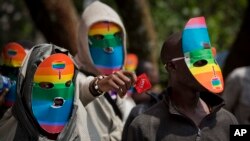The Kenyan High Court — ignoring objections from a number of politicians and cultural leaders — has ruled that a gay and lesbian organization should be allowed to officially register. Things might be improving for the LGBT community in Kenya, but plenty of challenges still remain.
When Kenyan lawyer Eric Gitari went to register his legal aid organization, the National Gay and Lesbian Human Rights Commission, he was refused and told to find a less explicit name.
Instead, Gitari took the matter to court — and to the surprise of some Africa-watchers — he won. On April 25 the Kenyan High Court ruled that the NGLHRC should be allowed to officially register.
Human Rights Watch’s Graeme Reid says the judgment is an important victory not just for LGBT rights, but for the Kenyan constitution.
“The judgment makes a very important point — freedom of association cannot be limited on the basis of popular opinion, and also that subjective moral beliefs and subjective moral convictions cannot be the basis for limiting rights," said Reid. "The whole point of the constitution is to provide protection to those people who would not be protected because of popular prejudice and discrimination.”
The judges also pointed out that Kenya’s colonial-era sodomy laws, which prohibit “carnal knowledge against the order of nature,” are vague. They questioned whether homosexuality was indeed “against the order of nature.”
Gitari says he was thrilled by the decision, which promises to make it easier for gay and lesbian Kenyans to advocate for their rights.
“It’s like we’ve broken the walls of the dam, and what we are witnessing is a greater increased civic disposition and a greater agency by our clients. There’s more confidence by queer persons in Kenya that they are included in this republic, [and] that the constitution actually works,” said Gitari.
Still a conservative country
But Kenya is a conservative country, where homosexuality is still widely frowned upon. The court’s decision has come under fire from politicians and religious groups, and Deputy President William Ruto said recently that there was “no room” for homosexuals in his country.
Gitari says that although rare, outbreaks of violence against homosexuals do still occur.
“One of our clients was stabbed with a bottle in his chest. And despite being stabbed with a bottle the police still arrested him instead of saving him, and charged him with sodomy,” he said.
But he does not feel threatened, he says, and he does not think homophobia is an innate aspect of Kenyan society.
"These issues are instigated by politicians and religious leaders. We have not seen mobs and youths and neighbors attacking homosexuals out of their own volition. The homophobia is taught,” he said.
More tolerance
On the whole, says Gitari, Kenyans are actually growing more tolerant. A survey last year found that over 40 percent of Kenyans thought the government should be focusing on other things than legislating against homosexuality. Gitari says there has also been more support for LGBT rights in the local press.
“There’s more humanization of who we are. Perhaps it’s because more and more people have been coming out,” he said.
There is always a risk that the issue could become politicized, he adds, with politicians stirring up homophobia to win votes. But if that happens Gitari is prepared to fight for LGBT rights through the courts.
The NGLHRC is already working to combat labor discrimination, and cases of wrongful eviction. Soon, says Gitari, they plan to take on Kenya’s sodomy laws themselves.




